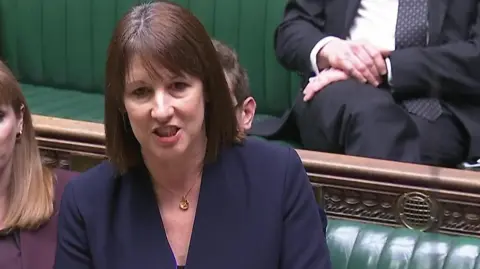Reeves defends herself after market turbulence
 PA Media
PA MediaChancellor Rachel Reeves has hit back at criticism of her handling of the economy after a turbulent few days for the pound and UK government borrowing costs.
By Tuesday afternoon, the pound stood at $1.215, slightly above the 14-month low of $1.21 that it hit on Monday.
Meanwhile, UK government borrowing costs were steady, but remained close to their highest levels since 2008.
Shadow chancellor Mel Stride said the situation was a "Shakespearean tragedy", but Reeves said it was "not reasonable to suggest" she was at fault for the market nervousness as borrowing costs were rising in other countries too.
She told the House of Commons the "economic headwinds" being faced by the UK meant the government had to go "further and faster in our plan to kickstart economic growth".
However, Stride said Reeves should consider her job as chancellor after what he said was "stagnation" in the economy following her Budget.
"To go or not to go: that is now a question," he said.
Many countries have seen their borrowing costs rise recently, but some have argued that decisions made in last year's Budget appear to have made the UK more vulnerable.
Governments generally borrow money by selling bonds to big investors, such as pension funds. UK government bonds are known as gilts.
The yield on the 10-year gilt - the interest rate at which the government pays back a decade-long loan to investors - dropped marginally to 4.88% on Tuesday, having risen to nearly 4.9% on Monday, its highest level for 17 years.
Meanwhile, by Tuesday afternoon the 30-year gilt yield stood at 5.44%, below Monday's peak of 5.46%.
Government debt costs in Germany, France, Spain and Italy have also been rising. Experts say investors are predicting US president-elect Donald Trump's tariffs will increase US inflation, meaning interest rates will remain high there and elsewhere.
"There has been global movements in international markets in the last week or so, and those have been global in nature, but in the UK we must do what we can," Reeves told the Commons.
However, some economists have told the BBC that the government is at least partly to blame for the current sell off.
"It's been a relatively dramatic couple of weeks for the gilts markets and for the pound," Nina Skero, chief executive of the Centre for Economics and Business Research, told the BBC.
"It's been somewhat of a worldwide phenomenon, but it seems to be particularly intense in the UK."
She pinned the UK's specific problems on a "delayed response to the very heavy tax and spend in the Budget", adding that "we're going to have to wait some months, maybe even some quarters, to see the real impact".
Economists and retailers have said measures introduced in the Budget, such as the increase in employers' National Insurance contributions, will spur inflation.
However, Ms Skero added the 2022 market reaction to former Prime Minister Liz Truss' mini-Budget was still greater in terms of magnitude.
"And that situation was entirely UK-focused," she said.

Sign up for our Politics Essential newsletter to read top political analysis, gain insight from across the UK and stay up to speed with the big moments.
It'll be delivered straight to your inbox every weekday.
